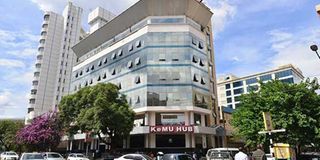Premium
Methodist Church sells assets to offset KeMU’s Sh3bn debt

KeMU Hub in Nairobi, one the assets that the Methodist Church of Kenya has offered for sale in order to pay part of the Kenya Methodist University’s Sh3 billion debt. PHOTO | FILE | NATION MEDIA GROUP
What you need to know:
- Bishop Joseph Ntombura said that the debts are historical as they were incurred between 2007 and 2012.
- The VC stated that whenever the university encounters financial problems, it runs to its sponsor, the church.
- Board of trustees chairman Silas Muriuki explained that the debts came as a result of mismanagement by previous leaders.
The Methodist Church of Kenya (MCK), which manages the Kenya Methodist University (KeMU), has put two of its prime assets on sale in order to offset part of the university’s Sh3 billion debt.
The church’s presiding bishop Joseph Ntombura, who is also KeMU’s chancellor, said that the management has offered for sale the five-storey KeMU Hub located along Nairobi’s Koinange Street, and a 0.875-acre plot at the junction of Lower Factory Road and Kipchoge Avenue in Nakuru Town, with a residential building to potential buyers in order to reduce the debt the university has.
ENOUGH ASSETS
“We have about Sh1.8 billion in loans and Sh1.3 billion as credit. When we sell some of our assets we can reduce some of the debts we have. The church will also come in and inject some cash to keep the university going as KeMU belongs to the church and we have enough assets to bail it out,” said Rev Ntombura during a press conference in Nairobi on Saturday.
The bishop said that the money which will be received will go towards settling debts owed to Kenya Revenue Authority (KRA), paying arrears to sacked workers as well as gratuity.
He said that the debts are historical as they were incurred between 2007 and 2012 way before he came into office.
FINANCIAL CHALLENGES
At the same time, Vice Chancellor Maurice Okoth acknowledged that the university has had financial challenges just like any other universities in the country but denied claims that the institution would be closed.
He said he is not aware of the closure claims as the institution is in good relationship with the Commission for University Education (CUE) and other regulatory bodies in the country.
The VC stated that whenever the university encounters financial problems, it runs to its sponsor, the church, to bail them out. He added that they are introducing new programmes at the university.
Prof Okoth said the university’s next graduation is set for October 13.
“KeMU is well and sound and we have students who have just reported. Currently, we have 8,000 students in session. From where we sit, we have not been interfered with as the management,” said Prof Okoth.
MISMANAGEMENT
The university’s board of trustees chairman Silas Muriuki explained that the debts came as a result of mismanagement by previous leaders. He cited a bloated workforce caused by over employment, loans and inflated salaries as some of the causes of the accumulation of the debts.
“Yes, we are facing some financial constraints but we are not closing,” said the former North Imenti legislator.
On reports that the church’s leadership is embroiled in wrangles and is dysfunctional, Bishop Ntombura laughed off the claims, saying that the rumours are being peddled by a section of former church leaders bent on causing destabilisation.
While he acknowledged that there are bound to be divergent views and opinions in any organisation, the bishop accused a section of former leaders of the church of resorting to a smear campaigns aimed at mudslinging him and the current leadership.
ACTIVISM
“MCK is indeed as firm, healthy and forward-looking as ever before. This political activism is totally out of order of conduct of Methodist ideals and values. The church leadership and the presiding bishop are united and forging forward in executing the aims and aspirations of MCK,” he said.
But the bishop offered to reconcile with the four disgruntled former leaders of the church, whom he did not mention by names, saying that they are welcome back but on condition that they do so within the confines of the church’s rules of conduct.
“MCK standing orders are as democratic as they can be. They provide for appeal of disciplinary measures with clear procedures and processes. If a member is errant, we call in established church disciplinary measures which are transparent, verifiable and credible,” said Rev Ntombura.





